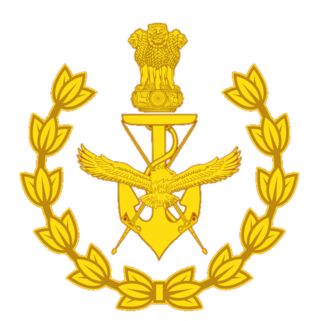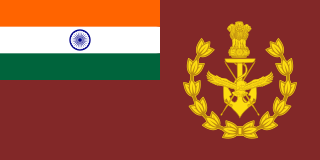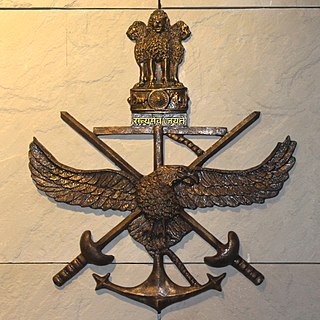
The Strategic Forces Command (SFC), sometimes called Strategic Nuclear Command, forms part of India's Nuclear Command Authority (NCA). It is responsible for the management and administration of the country's tactical and strategic nuclear weapons stockpile. It was created on 4 January 2003 by the Vajpayee Government. Air Marshal Teja Mohan Asthana became its first commander-in-chief.
The Nuclear Command Authority (NCA) of India is the authority responsible for command, control and operational decisions regarding India's nuclear weapons programme. It comprises a Political Council headed by the Prime Minister of India and an Executive Council headed by the National Security Advisor.

The Ministry of Defence (MoD) is charged with coordinating and supervising all agencies and functions of the government relating directly to national security and the Indian Armed Forces. The President of India is the ceremonial commander-in-chief of the armed forces of the country. The Ministry of Defence provides policy framework and resources to the armed forces to discharge their responsibility in the context of the country's defence. The Indian Armed Forces and Indian Coast Guard under the Ministry of Defence are primarily responsible for ensuring the territorial integrity of India.

The National Defence College, located in New Delhi, is the defence service training institute and highest seat of strategic learning for officers of the Defence Service and the Civil Services. This is a very prestigious course attended only by a few hand-picked defence officers of One-Star rank and civil servants of the rank of Joint secretary to the Government of India. Each year, approximately 25 officers from friendly foreign countries like the US, UK, Canada, France, Germany, Australia, Vietnam, Sri Lanka, Nepal, UAE and others attend the course.

General Bipin Rawat was an Indian military officer who was a four-star general of the Indian Army. He served as the first Chief of Defence Staff (CDS) of the Indian Armed Forces from January 2020 until his death in a helicopter crash in December 2021. Prior to taking over as the CDS, he served as the 57th Chairman of the Chiefs of Staff Committee of the Indian Armed Forces as well as 27th Chief of the Army Staff (COAS) of the Indian Army.
The Defence Planning Committee is a senior decision-making organisation created on 19 April 2018 by the Government of India.

The Integrated Defence Staff (IDS) is an organisation responsible for fostering coordination and enabling prioritisation across the different branches of the Indian Armed Forces. It is composed of representatives from the Indian Army, Indian Navy, Indian Air Force, Ministry of External Affairs, Defence Research and Development Organisation (DRDO), Ministry of Defence and Ministry of Finance. The IDS is headed by Chief of Integrated Defence Staff along with Deputy Chiefs of Integrated Defence Staff. On December 24, 2019, the Cabinet Committee on Security (CCS) established the post of Chief of Defence Staff, a four-star general, a tri-service Chief, that shall lead the defence forces as well as play the role of head of the Department of Military Affairs. The body advises and assists the Chief of Defence Staff.

The Chiefs of Staff Committee (COSC) is an administrative forum of the senior-most military leaders of the Indian Armed Forces, which advises the Government of India on all military and strategic matters deemed privy to military coordination, direction and policy between the country's three armed services. By organization, the COSC is comprised several key members, namely, Chief of Defence Staff - who acts as the Committee's Permanent Chairman, along with the Chief of the Army Staff, the Chief of the Naval Staff and the Chief of the Air Staff - all of whom are also additionally supported by the Chief of Integrated Defence Staff.
The Defence Cyber Agency (DCyA) is an integrated tri-services agency of the Indian Armed Forces. Headquartered in New Delhi, the agency is tasked with handling cyber security threats. The DCyA draws personnel from all three branches of the Armed Forces. The head of the DCyA is an officer of two-star rank, and reports to the Chief of Defence Staff (CDS) through the Integrated Defence Staff (IDS).

The Chief of Defence Staff (CDS) is the principal military authority and senior-most appointment of the Indian Armed Forces. Deemed the overall professional head of India’s three armed services, namely, the Indian Army, the Indian Navy and the Indian Air Force, the CDS is the highest-ranking military officer in service, responsible for overseeing inter-service jointness across all disciplines related to military functioning. Primarily, the office operates on a status of primus inter pares i.e., first among equals with the chiefs of the three services, and functions as the Permanent-Chairman of the Chiefs of Staff Committee (COSC) – the inter-service syndicate responsible for ensuring the establishment and preservation of military integration.

The Armed Forces Special Operations Division (AFSOD) is an integrated tri-services division of the Indian Armed Forces. The division is tasked to carry out special operations. The AFSOD draws personnel from all three special warfare branches of the Indian Armed Forces.

The Defence Space Agency (DSA) is an integrated tri-services agency of the Indian Armed Forces headquartered in Bengaluru, Karnataka, India. The agency is tasked with operating the space-warfare and Satellite Intelligence assets of India. The DSA draws personnel from all three branches of the Armed Forces.

Commander-in-Chief, Andaman and Nicobar Command (CINCAN) is the head of the Andaman and Nicobar Command, the first and only Tri-service theater command of the Indian Armed Forces, based at Port Blair in the Andaman and Nicobar Islands, a Union Territory of India.

Department of Military Affairs (DMA) is the department in charge of military matters within the Indian Ministry of Defence. Headed by the Chief of Defence Staff, as its ex-officio secretary, the DMA provides integration between the armed forces of the Union and the Ministry of Defence.
Air Defence Command was a proposed unified tri-services command of the Indian Armed Forces. The command would be headed by a three-star Indian Air Force officer.

Integrated Theatre Commands of the Indian Armed Forces are varying degrees of synergy and cross-service cooperation between the military branches of the Armed Forces. Following Independence, in 1949 a joint educational framework was set up starting with the first tri-service academy in the world, the National Defence Academy, and over the years this joint educational framework has been expanded to bring officers from the different services together at different stages of their careers.
Maritime Theatre Command (MTC), previously referred to as Peninsular Command, is a proposed inegrated tri-services command of the Indian Armed Forces whose responsibilities may include the command and control of the entire Indian naval fleet and coastal defence operations. It is envisioned to include assets from all the branches of the Indian military.
Western Theatre Command is a proposed Inegrated Theatre Command of the Indian Armed Forces. The command will be responsible for looking after the India–Pakistan border starting from Siachen Glacier in north to Gujarat in south.










